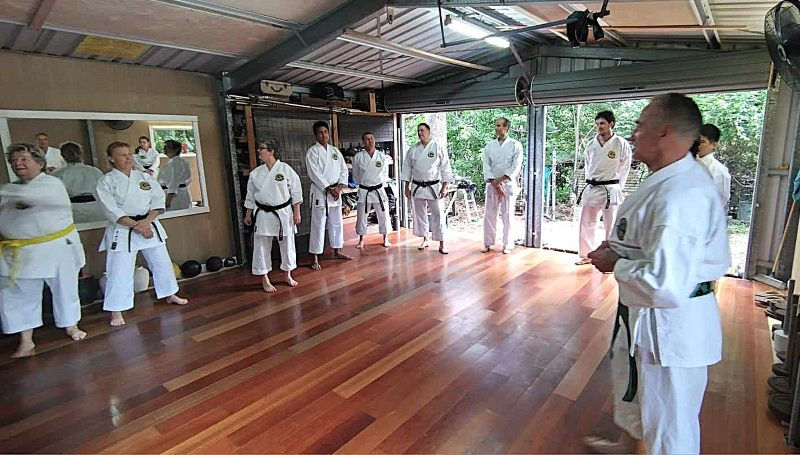Naka Sensei - Isn't it time you changed clubs?
- OGKK Australia

- Nov 17, 2024
- 4 min read

The gentleman in the picture—recognize him? Chances are, you've come across his videos on YouTube, no matter your karate style. This is Naka Sensei, a well-respected instructor from the Japan Karate Association (JKA). After watching many of his videos over the years, it’s clear as daylight that he’s been on a deep quest to uncover the true essence of karate. I also get the sense that he's been questioning (for quite some time now) whether what the JKA offers is truly what he, or anyone else, considers to be "karate."
I don’t know the man personally, but he comes across as a genuine enough person—the kind I'd be happy to invite to a family BBQ and talk all things karate with. But imagine dedicating your entire life to a particular club or style, only to suddenly find yourself questioning: "Who am I really fooling? Is this what karate is truly about? There’s gotta be more than explosive punches and practicing blocks that you know don’t make sense." From an outsider’s perspective, it seems that deep down, he wants to break free - perhaps exploring deeper into Shorin-ryu, Okinawan Goju-ryu, or something else entirely. One thing is clear: he’s searching for something more—a lottttt more, judging by the number of trips to Okinawa he’s already taken.
So, what’s stopping him? Well, being Japanese is probably the biggest hurdle. The hierarchical nature of most Japanese karate organizations is deeply ingrained, not just in practice, but in identity. From personal experience, a karateka’s rank and status within a Japanese dojo are tied to years of training, experience, and loyalty to the organization. These osssssu institutions can be rigid and unforgiving, with a heavy emphasis on respect for authority and tradition, and more osssing…..osssssssu.
Leaving this structure might feel like abandoning a part of oneself. It’s not just about stepping away from a sensei's role; it’s about leaving behind a system that provides so-called security, respect, and a sense of belonging. The fear of losing this status, of being cast aside by peers in the karate community, could make it difficult to fully embrace the Okinawan way of karate - making it nearly impossible to cut ties with an existing club completely. This is why you often see practitioners belonging to two or three karate organizations or even combining karate with another martial art.
From my observations over the years, some practitioners are drawn to the clarity and order that these established karate organizations seem to offer - the feeling of being part of something larger than themselves. “Our club is the largest in such-and-such city,” they say, (whoop dee doo) often believing that bigger is better. Therefore, the idea of breaking away, even in pursuit of a more authentic budo experience, may remain just a fleeting thought.
So why am I writing about Naka Sensei and the JKA, especially when he has no direct connection to us? Well, let me introduce one of my students. Let’s just call him “Andrew,” shall we? Around this time last year, Andrew reached out to me with a one-page essay detailing his karate situation and why he wanted to train with me. Like Naka Sensei, Andrew is a well-respected senior figure in the karate community and belongs to the JKA (Australia). Heck, he’s probably done karate longer than I’ve been alive. At first, I was a little hesitant to give him a chance. After all, what are the odds of a senior instructor wanting to learn something different, willing to make changes, and eventually jump ship? I worried I’d be wasting my time and energy on yet another student who would eventually bail on me. Before making any hasty decisions and replying with a polite "go away mate," I consulted my two senpai about his situation. “What’s the worst that could happen? If he’s a good bloke, maybe a solid relationship could still be established, regardless of whether he continues with Goju or not,” they responded. And the rest is history.
Today marks one year of training with me. During this time, I was told that I have given him, and I quote, “the inspiration and encouragement needed (not to mention a generous donation of two large mirrors) to remodel my backyard shed into a dojo.” Taking responsibility for one’s own training—you couldn’t ask for anything more.

Although Andrew is still technically with the JKA, I’d say he’s now 90% crossed over that plank to us and OGKK...just a bee’s dick to go. His heart is in it, and extremely eager to make continual changes and improvements. Furthermore, his movements are no longer rigid or tense (yeah right 🤣). Instead, he's fully embracing Okinawan Goju's relaxed yet intense approach to training - where everything has a purpose, a concept that was once more foreign to him than memory in a dementia ward. I know how daunting it can be to leave a large company or karate club where you've built a name for yourself, and valuable relationships over the years. But to walk away from something you no longer believe in and start over – well that absolutely demands respect... and require a pair of elephant-sized nuts.
If my student after more than 40 years with the JKA, can make the leap, then Naka Sensei, you too can do it. Life's too short to waste time and energy on anything that saps your life. So stop fooling yourself mate - what’s there to fear?
Anyway, here’s a big fat toast to those who’ve jumped ship from their soul-sucking dojos and questioning life choices! Cheers to a more prosperous, happier, and meaningful training journey - where the only thing you’re trying to get rid of is pointless nonsense, not your passion for karate.






Comments